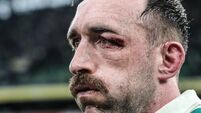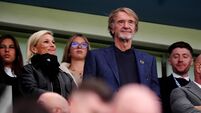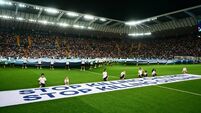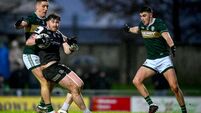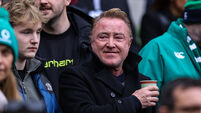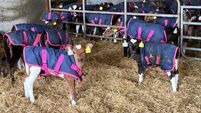Poetry in motion - the Patsy Dorgan Interview

I missed Cork. It was as simple as that. I just loved Cork. I loved being in Cork. I loved coming home to Cork. I hated going away from it and always loved coming to it.”
Patsy Dorgan is at home and looks it.
The day before we meet in the Imperial Hotel, Patsy turned 80. He hasn’t been well so there is a frailness about him, but a serenity too.
A great love of Cork has defined many men, obstructing some, inspiring others.
Maybe it partly defines Patsy. It might have stopped him becoming the footballer he could have become with Blackburn Rovers.
But it also delivered him back to his stage; gliding through the frenzy when near 20,000 could throng the Mardyke for a Cork derby with everything riding on it.
“You have to have it in here,” he says, near the end of our chat, tapping his heart.
Maybe he couldn’t have played his best football any other place.
Later in life, it was leaving Cork that unlocked something else in him. Poetry. Partly to cope with the distance.
He calls Trinidad home now too, though he still cries sometimes, at mention of Cork.
Half a century after he togged out for the last time in the League of Ireland, it is easy to see, in his stately gait, why the first word anyone who saw him play uses is ‘elegant’.
His greatest asset was timing, at the top of his jump with the centre-forward on the way down.
Less straightforward now, perhaps, to detect the steel that once persuaded Blackburn to send him out to man-mark one of the Busby Babes.
My uncle Sean, Lord rest him, had a phrase for people he liked: “One of life’s gentle souls.” Instantly, you know it describes Patsy.
“When I knocked lads down, they stayed down,” his old Cork Celtic rival, John Coughlan, used to joke, “but when Patsy knocked a man down he picked him up and said ‘sorry about that’.”
“A gentleman, one of the nicest guys you could meet. A terrific guy, very easy-going, charming guy,” was old teammate Donie Wallace’s assessment.
“I don’t know was he ever booked,” says historian Plunkett Carter.
But he had it in here.
***************

Patsy remembers well his boyhood living in Horgan’s Buildings, off Magazine Road in Cork, where Danny La Rue was a neighbour.
At school, in St Joseph’s, the Mardyke, Patsy loved and excelled at GAA, which was just as well, because he hadn’t any choice.
“Billy Neville, who went on to play for West Ham, a great player, was captain of the hurling team and I was captain of the Gaelic football team. We got on very well. We were kind of big shots. It was a lovely time in my life.”
He remembers well the day of the illicit approach, when he was tapped up.
“A note was passed down from the front of the class by Pat Dineen. ‘Would you like to play soccer with Crofton?’ Oh God, I would.”
He was out of school at 14, delivering messages between Coach Street and the Coal Quay. What strikes him now is the shocking bad language of some of his older colleagues.
But he remembers best of all that bright spring morn on the day history was made.
Playing soccer for Glasheen now, again with Pat in goal, they reached the FAI Minor Cup final, where they would play the renowned Home Farm.
“Oh God, they were some team. They’d won everything.
“The game was at Dalymount Park. It was incredible. My friends and brothers were coming up to see me playing. A big bus came up. We were driven up in cars.
“Tipping about beforehand, that was the most anxious part. Just passing it back and forth. You had no more intention of loving the ball. And we loved football.
“This was a chance for all of us.”
And then the stakes got higher.
“Patsy, Jackie Carey is here. He’s up in the stands.”
Former Manchester United and Ireland captain. Then Blackburn Rovers manager. Dream-maker.
“The game started. One of our wing-halves passed back to me. And I went on a run into the other half. And I felt great about this. And I’m looking around for Jackie Carey.
“I got possession again. And tried to side-foot it back to Pat. And I had one eye on Carey, and one eye on Pat. My foot got caught. And your man whose son played for Liverpool, Ronnie Whelan, I remember he smiled going past me. And he took a shot at goal. And it was a fabulous save by Pat. Over the bar, tip of the fingers. A brilliant save. My prayers were answered.”
The man who bailed Patsy out would later be called on by the government to solve problems in Irish Steel and Bord na Móna after eyes had been taken off the ball. He made his millions in insurance and captained Ireland cricketers to beat the West Indies in 1969.
More importantly, he kept a clean sheet in Dalyer and Glasheen won 2-0 to becoming the first Cork AUL side to win a national trophy.
In the dressing room afterwards, ‘Mr Carey’ came in and the place hushed, agog “at this great, great man” who presented Patsy the first big decision of his life.
“We had a team and we loved each other. We were like a load of brothers. We wanted to stay together. We were saying we should keep the team together and go up to the Mardyke and play. But I sold my soul to Blackburn Rovers.”
Four were chosen for a trial. “Donie Wallace, a great player. Donal Leahy, myself, and Donal O’Leary.
“Donie Wallace had a grandmother who looked after him all his life and he was taking care of her, which was a lovely, lovely thing. But it was a pity. He would have made it all the way. He didn’t allow himself to go. And he was kind of crying when we were coming away.”
Later, Donie, another of Cork football’s greats, winner of League of Ireland titles at Limerick and Cork Hibs, plays it down.
“Ah, I was living with the grandparents. All the family had emigrated, so I wasn’t keen to go.
“I was never keen on going to England anyway. I got a job and I played for 20 years after. They had to shoot me in the end. I think I made the right choice.”
Patsy and Donal O’Leary went away.
“It was hard. leaving my mother behind me, who I adored. All my brothers had gone abroad and she wanted to hang onto me. And she worried. ‘Be sure you eat up well. Don’t be leaving things on the plate’.
“There was another fella from Galway. And two of the lads from Home Farm. We didn’t like the Home Farm guys and they didn’t like us, but we took the guy from Galway into our hearts. Though he only lasted a few months.”
O you remember the game against the Busby Babes?

“Will I ever forget them? They were wonderful, great players. Liam Whelan would have played. But not Duncan Edwards. He was the one we were all in awe of. We went to see them once when Blackburn hadn’t a game.”
It was Patsy’s first game for Blackburn reserves. At Old Trafford.
“They had a fella playing with them called Swivel Hips. Bandy legs. Built like Donie Wallace. He would run you ragged. He was about to go into the first team, but he was young. I was the one to watch him. I thought I had a really good game, because I put my heart and soul into it. To keep this fella at bay. The coach was telling me stick to him, stick up his ass.
“And I was fairly fit at the time and I kept up with him. I kind of spoiled a lot of his play.
“Notes would go back to Mr Carey. And he called me out afterwards; ‘I heard you had a blinder’. But I’ll always remember Swivel Hips.”
Eddie ‘Swivel Hips’ Coleman — also known as Snake Hips, for his body swerve — was the youngest of those who lost their lives in the Munich air disaster, aged 21. Liam Whelan was 22.
Patsy lasted three years at Blackburn.
“To play in the first team it was 12 pounds, the second team was nine pounds, and the third team was six. But it was great money. I was sending money home.
“Donal O’Leary made the first team, but one day he got a letter. I don’t know what it was about. But he had to go home. I was lost. I was all on my own.
“He used to write and say he was playing for Evergreen, and send me the cuttings from the Cork Examiner. But I’m not blaming him on my going home.”
Jackie Carey tried to talk him out of it, told him he was on the brink of the first team, but the pull of home was too strong.
“I wanted to play with Hibs.”
So he came home to a job in Aer Lingus and become one of the most glamourous characters in an exciting era in Cork football, when the Mardyke and the Cross, and later the Lodge, hosted fierce battles for local pride. Hibs or Celtic — a time when that choice defined families.
“One of the finest pivots in the league. Clean-cut, always attired in splendid gear and looking the part, Patsy had thousands of admirers and they were not all male soccer fans,” is how Plunket Carter puts it.
Patsy smiles away any Beckham comparisons. “I suppose I was a bit of a show-off. I hated kicking the ball to no one. I liked to look around and see who wants this ball. And if it broke down, the crowd would have your guts for garters.”
“Like Beckenbauer,” his old friend Noel Bradley says. “Majestic.”
Donie Wallace can still feel the heat of those derbies. “That was the game of the season. The supporters were unbelievable. It was the big stuff. When you were at work, they would nearly be fighting one another on the floor.
“The joke about it was we were all pals. Grand old times. There was no animosity at all between the two teams.”
Ironically, Donie was in exile in 1960, the year the rivalry arguably peaked with both sides in contention when they met at a jointed Mardyke with three games to play. A 3-3 draw did neither favours, and Donie’s Limerick won the title.
That Hibs side of Jackie Morley and Tony O’Brien suffered heartbreak in the cup final too, against Shelbourne, though Patsy’s memories are mostly blissful.
“There was such interest. They’d put the Player of the Month out in a window in Patrick Street in one of the shops. And on a Monday, vanity I suppose, you’d go down with a few of your mates to see who was up on the poster. It was often the Celtic players because they were doing well.
“One day, I went down and looked and I got a tap on the back, saying ‘Yeah, Patsy, that’s you.”
Pleasure to meet Patsy Dorgan, a Cork icon and one of the League of Ireland's finest centre halves. An elegant gent pic.twitter.com/fPRm3c10XQ
— Larry Ryan (@RyanLarry) March 23, 2016
“We had a few friends among the Rovers players and the Shels players. And we all kind of knew one another. One day, we were playing Rovers, this lad came over and asked me what I was getting a week. This was one of the top lads.
“I said eight pounds. He said ‘What, I’m playing with Rovers and I’m only getting three. And Rovers won’t break that’.
“And they were getting big crowds. I was afraid to tell anyone else. I was ashamed nearly.”
Patsy joined Celtic briefly before he retired and played for many years for the airport team. A Cork Examiner clipping from 1968 has Patsy score four and head the equaliser in a 5-5 draw with Swiss Air at Turners Cross, preserving Aer Lingus’s unbeaten record against other airlines.
He played his last game for Aer Lingus in the Cork Shipping League, aged 50.
That same year, walking in Fitzgerald’s Park, he got talking to a man who asked him if he ever wrote things down, for after he was gone. This man highly recommended it.
After his wife Sadie died, Patsy began to visit his family friend Patrick Brennan, a Dominican missionary in Trinidad. “I’d visit him for maybe two weeks. I fell in love with the place and the people.”And with Kay, now his wife for 15 years.
But he still had Cork in here.
“I used to literally cry when home would come up. If Kay mentioned something, or if I saw the Examiner. I’d think, ‘maybe I did the wrong thing here’.”
He remembered that chat in the park.
“Something came into my mind one night. A line or two for a poem. I thought they were brilliant. I was getting out of bed, in pitch dark, looking for my pencil.”
He was afraid to show anyone for a long time. “I thought I was only making a fool of myself. I was never very confident in myself.”
Three books of poems later, many of them paeans to home, what stands out is the lovely generosity of spirit throughout, notably in ‘When History Was Made’, when those sung loudest are the unsung heroes, Dave Fahy, Bunt Herrick, Andy Cotter and the rest.
Who taught him how to play the game.
- For more on Patsy Dorgan’s Hall of Fame award, visit scoreboardmemories.com
I remember well that bright spring morn
The ecstatic jubilation
On our way to Dublin
With wild imagination
From the broad Glasheen environs
We set out to procure
A ‘blue riband’ football laurel
And a place in Cork folklore
We faced the wrath of Home Farm
A renowned and debonair foe
Having reached the pinnacle
True grit we now must show
They were the nation’s finest
Most feared near and afar
But firm was our commitment
Like Cork’s own Saint Finbarr
We braved a seething cauldron
As we trod that famous soil
A silent prayer made light the fear
The stage was set for a battle royal
It was not a time for giving up
But a time for holding on
Not a time for looking back
But a time for being strong
Well prepared in spirit
Our young hearts beat with pride
We rose to every challenge
No one dared to hide
And when that long-shrilled whistle blew
Elusive gold, so proudly won
Victory’s cry was resonant
Glasheen’s reign had now begun
Let us not forget the unsung heroes
Many are gone, they could not stay
They played a part in our young lives
Helped us be what we are today
Dave Fahy, Bunt Herrick, Andy Cotter,
Pat Regan, Sonny Neville, the Maloney Brothers too
They taught us how to play the game
To Glasheen’s cause, they were ever true
They showed us too, life’s grand old ways
Seldom taking us to task
Men of wisdom and integrity
What more could mankind ask
May this great club of renowned fame
Renew again, that burning flame
And while its glow is shining bright
Unfurled will be the Blue and White
Premier League Manager of the season
Premier League Player of the season
Premier League Flops of the Season

